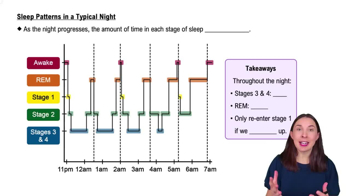Table of contents
- 1. Introduction to Psychology1h 43m
- 2. Psychology Research2h 20m
- 3. Biological Psychology2h 41m
- 4. Sensation and Perception28m
- 5. Consciousness and Sleep32m
- 6. Learning41m
- 7. Memory34m
- 8. Cognition37m
- 9. Emotion and Motivation35m
- 10. Developmental Psychology33m
- 11. Personality48m
- 12. Social Psychology41m
- 13. Stress and Health41m
- 14. Psychological Disorders44m
- 15. Treatment47m
5. Consciousness and Sleep
Sleep
Struggling with Psychology?
Join thousands of students who trust us to help them ace their exams!Watch the first videoMultiple Choice
Theodora suffers from an inability to get to sleep and to stay asleep. Which of the following would help Theodora with her insomnia?
A
Watching the clock so she knows how much sleep she is actually getting
B
Trying various sleeping pills until she finds one that does not cause REM rebound
C
Spending some time in bed relaxing, reading, or watching TV until she gets sleepy
D
Going to bed and getting up on a regular schedule
 Verified step by step guidance
Verified step by step guidance1
Understand the nature of insomnia: Insomnia is a sleep disorder characterized by difficulty falling asleep, staying asleep, or waking up too early and not being able to go back to sleep.
Identify the importance of a regular sleep schedule: A consistent sleep schedule helps regulate the body's internal clock, making it easier to fall asleep and wake up naturally.
Evaluate the options: Consider why watching the clock, using sleeping pills, or engaging in stimulating activities before bed might not be effective solutions for insomnia.
Recognize the role of sleep hygiene: Good sleep hygiene practices, such as maintaining a regular sleep schedule, can improve sleep quality and help manage insomnia.
Implement the solution: Encourage Theodora to establish a regular bedtime and wake-up time, even on weekends, to help her body develop a natural sleep-wake cycle.

 3:25m
3:25mWatch next
Master Circadian Rhythms with a bite sized video explanation from Hannah Gordils
Start learningRelated Videos
Related Practice


































































































![Race, Genes and IQ Differences | Bret Weinstein [Mini Clip]](https://img.youtube.com/vi/IztL_m3pd70/mqdefault.jpg)



































































































